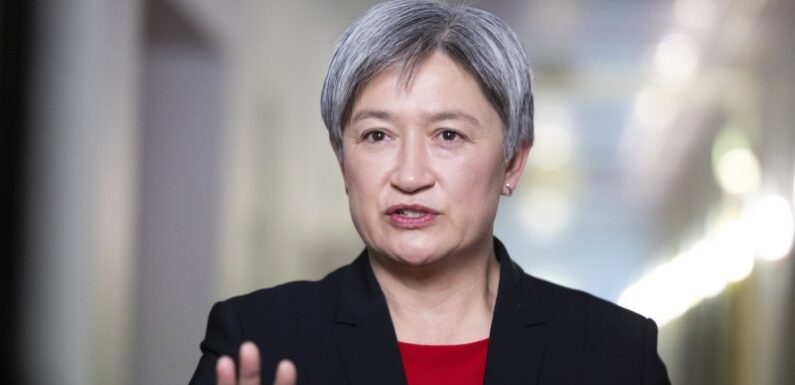
Save articles for later
Add articles to your saved list and come back to them any time.
Australia will seek new stability in relations with China without giving ground on core concerns about regional conflict or economic coercion, revealing a cautious agenda for Prime Minister Anthony Albanese in talks with Chinese President Xi Jinping on Monday.
Albanese will aim to build stronger lines of communication with the Chinese leader after years of friction on security and the economy, with the federal government claiming success in breaking down trade sanctions on Australian exports worth $20 billion a year.
But Foreign Minister Penny Wong warned against the “risky behaviour” from China in territorial disputes in the South China Sea, amid weeks of contention about a collision between a Chinese coast guard vessel and a supply ship from the Philippines.
Foreign Minister Penny Wong.Credit: Alex Ellinghausen
Wong said the talks in Beijing on Monday, the first visit by an Australian prime minister to the Chinese capital in seven years, showed the government could stabilise the relationship with China without compromising on core interests such as trade.
The foreign minister will join the Beijing meeting before a brief stopover in Tokyo for talks on the sidelines of a G7 summit where US Secretary of State Antony Blinken will meet counterparts from Canada, France, Germany, Italy, Japan, the UK and the European Union.
In an implicit criticism of the Coalition for using belligerent rhetoric against China in the last term of parliament, Wong pointed to the removal of Chinese restrictions on Australian exports as vindication of Labor’s approach.
“We said to the Australian people before the last election that we would work to stabilise the relationship without compromising Australia’s sovereign interests,” she said in an interview on Friday.
“And that is what we have done. And we’ve reached this point without compromising on what is important to us.
“We’ve done so through calm and consistent dialogue, we’ve done so through engagement.
“We know there will be differences to navigate with China. We are very different political systems, we’re very different nation states.
“But it is possible for us to have a constructive and stable relationship that we can grow, and uphold our national interests, if we navigate our differences wisely.”
Tensions with China over cyberattacks, espionage, foreign interference, the AUKUS alliance and the pandemic led to a diplomatic rupture over several years, with no prime minister visiting Beijing since Malcolm Turnbull’s trip in April 2016.
Australian Security Intelligence Organisation director-general Mike Burgess took the rare step of rebuking China two weeks ago over the theft of intellectual property in advanced technology, a sign of the remaining commercial and strategic tensions.
Wong said Australia had to recognise that China used “all elements of statecraft” to pursue its goals – and that this meant a shift in Australia’s approach.
“The separation of economic policy and national security policy, which was how people might have thought about the relationship with China in the past, is no longer the right frame,” she said.
“We need to recognise that China uses all elements of its statecraft. Australia needs to do the same, and we need to do it in a way that demonstrates unprecedented co-ordination of our statecraft.”
Asked about Chinese tactics against the Philippines and others in the South China Sea, Wong said all countries should observe the United Nations convention on the law of the sea.
“Australia can also make its views about risky behaviour clear,” she said. “It’s not in the interest of stability and peace in the region for there to be incidents at sea which put people at risk.”
Albanese flies to Shanghai on Saturday and will attend the opening day of the China International Import Expo on Sunday, with about 200 Australian firms exhibiting.
Executives from BHP, Rio Tinto, Cochlear, GrainCorp, Macquarie Group and other big companies are also attending events alongside Albanese, while the Business Council of Australia is sending its incoming president, Geoff Culbert, and its chief executive, Bran Black.
The BCA’s global engagement head, Warwick Smith, who is in Shanghai, emphasised the importance of the prime minister’s visit after years of restrictions on Australian coal, timber, barley, wine, seafood and beef.
“The actual numbers show that we’ve held our trade with China,” Smith told this masthead on Friday.
“At the same time, we’ve diversified into other markets, but you don’t do that overnight.
“The sentiment between the political leaderships is a lot better now, and that’s conducive to being able to think about longer-term investments – and those longer-term investments are coming forward, both from China to Australia and from Australia into China.”
Trade Minister Don Farrell, who will attend the Shanghai events, estimated in August that China had at first restricted exports worth $20 billion but now only $2 billion was still held back by Beijing’s roadblocks.
While curbs remain on some beef exports and seafood such as lobsters, the restrictions on wine are expected to ease after a five-month review launched by the Chinese government after Australia took the matter to the World Trade Organisation. Australia has paused the WTO complaint pending China’s review.
Cut through the noise of federal politics with news, views and expert analysis. Subscribers can sign up to our weekly Inside Politics newsletter.
Most Viewed in Politics
From our partners
Source: Read Full Article
